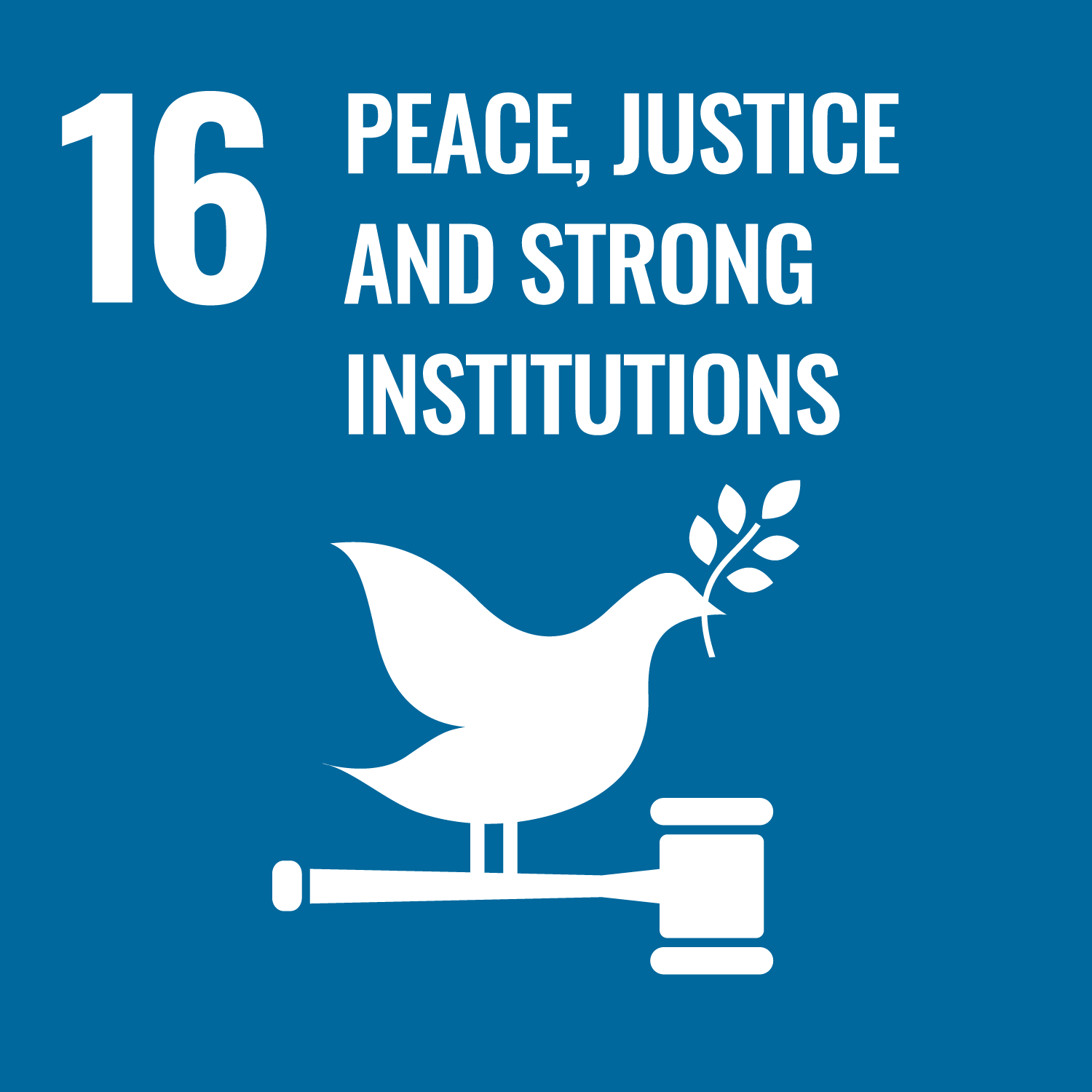目標16:和平正義與有力的制度

FREEDOM OF SPEECH
At Taipei Tech, we host regular Affairs Meetings to discuss important issues at the university; meeting participants consist of representatives elected from the faculty, student body, and staff, who form the highest governing body and voice their opinions in these meetings. The regulations passed in Affairs Meetings and the composition of the governing representatives are posted on the official website of the Office of the Secretariat.
Student self-government is a crucial element of the promotion of ethics and the democratic spirit. To protect the students’ right to speak freely and voice their ideas, concerns, and opinions to the school administration, Taipei Tech established student self-government in 2005 and the Student Council in 2007. In accordance with the regulations, student representatives can participate in school-level decision-making meetings such as the presidential election, university assembly, and student and academic affairs meetings. Taipei Tech also approves student applications to establish self-governing student groups. 62 student clubs and 23 student associations have been established so far.
Taipei Tech respects the diversity of opinions on offer from our staff, faculty, students and visitors. We have established a "Sound Wall" platform to provide a space for the free exchange of opinions. Stakeholders can also express their personal opinions publicly via social media platforms such as Dcard-Taipei Tech, PTT, and Facebook. In 2020, NTUT Student Associations were honored with the High Distinction Award, Financial Excellence Award, Presentation Excellence Award, and Outstanding Academic Rights Award at the College Student Union Achievement Exhibition, an indicator that Taipei Tech values the rights of students, and provides a safe, neutral platform for students to discuss issues openly.
ANTI-BRIBERY AND ANTI-CORRUPTION POLICY
As a public university, faculty and staff of Taipei Tech must strictly abide by the anti-bribery and anti-corruption policy and regulations issued by the government. The regulations are published on our website. For students, the Guidelines for Student Recognition and Discipline clearly stipulate the penalties for violations of the law.
In order to promote equal rights and freedom, Taipei Tech’s Library issues the Taipei Tech Youth bimonthly. In this publication, we encourage students to submit articles on different ethics topics in each issue. We particularly emphasize the rule of law and human rights by publishing articles on human rights, fairness, and justice to advocate for equality and freedom, with the aim of enhancing students’ knowledge of human rights and the rule of law while guiding them to learn to respect different ethnic groups. We also explore issues related to gender equality, such as the legalization of abortion and increasing women’s physical autonomy, and the difficulties faced by women who have recently immigrated to Taiwan.
STAKEHOLDER ENGAGEMENT
As a national, public university, Taipei Tech has to follow national regulations and policies regarding our engagement with local stakeholders or donors. In 2004, we established a Donation Management Policy to ensure that our funds were in order. We also show local stakeholders and donors how we use the donations we receive on our Giving website. Accordingly, Taipei Tech is able to identify local stakeholders and donors and engage with them.
At Taipei Tech, our Alumni Liaison Center, Office of Industrial and Academic Cooperation, and PR section are charged with recognizing and engaging with local stakeholders. The Alumni Liaison Center is in charge of engaging with our alumni network and managing the financial support and resources that our alumni provide. The Office of Industrial and Academic Cooperation is devoted to creating mutually beneficial relationships between Taipei Tech and corporations around the globe. The PR section is responsible for conducting effective conversation and communication with local stakeholders.
Taipei Tech has several policies that were designed to support academic freedom, including subsidies for interdisciplinary academic seminars, inter-university grants, international academic collaboration projects (in 2020, there were 19 collaborating institutions), and international joint research projects with top universities (i.e., the top 300 universities as ranked by QS). Taipei Tech also utilizes Problem-Based Learning (PBL) to promote cooperative research between Taipei Tech and other research institutions, hospitals, and enterprises, which enables researchers to enjoy enhanced academic freedom. Furthermore, Taipei Tech has developed an innovative R&D platform to collect information on research and development and educational opportunities, internships, and enterprises that allows researchers to browse and exchange information freely.
Taipei Tech has work together with government departments in policy implementation and research projects for many years. From 2019 to 2021, we initiated a total of 500 projects; our research projects amount to over NT $ 200 million every year.
PROVISIONS FOR POLICY RECOMMENDATIONS
According to the Civil Service Work Act and NTUT’s Guidelines on the Handling of Part-time and Secondment of Full-time Teachers, our faculty and staff members can concurrently hold positions as consultants in government agencies in their area of expertise to provide policy recommendations to their government agency. Since 2020, 307 faculty and staff members have concurrently held consulting positions in central or local government agencies. Furthermore, our teachers are entrusted by the government to provide professional recommendations. For example, Professor Song of the Department of Civil Engineering executed a 2020 prospective study of technical rules for offshore wind farm site surveys and design, and established assessment standards for offshore wind power technology in Taiwan.
Our faculty and staff members can also concurrently hold positions as policy advisors in government agencies in their areas of expertise to assist the government in researching and formulating regulations and policies. Since 2020, 55 part-time faculty members in our university have advised government agencies on economic topics, 12 on legal topics, 238 on technical topics, and 2 on climate change topics. Taipei Tech also participates in the Ministry of Economic Affairs’ Industry Professional Assessment System (IPAS) to promote nation-wide engineering talent training. Since 2020, we have built 5 technology bases, and trained more than 350 people in total.
GRADUATES IN LEGAL AND CIVIL ENFORCEMENT
Out of 700 graduates, 19 (0.5%) studied the ethics in law and civil enforcement.





 10608 台北市忠孝東路三段1號
10608 台北市忠孝東路三段1號 Tel:886-2-2771-2171#1021
Tel:886-2-2771-2171#1021